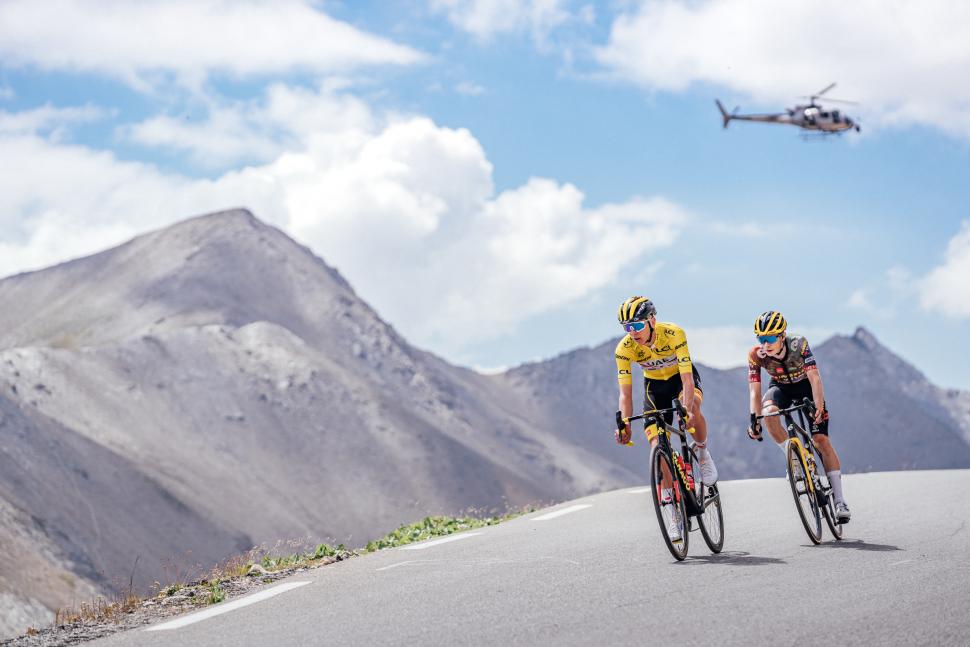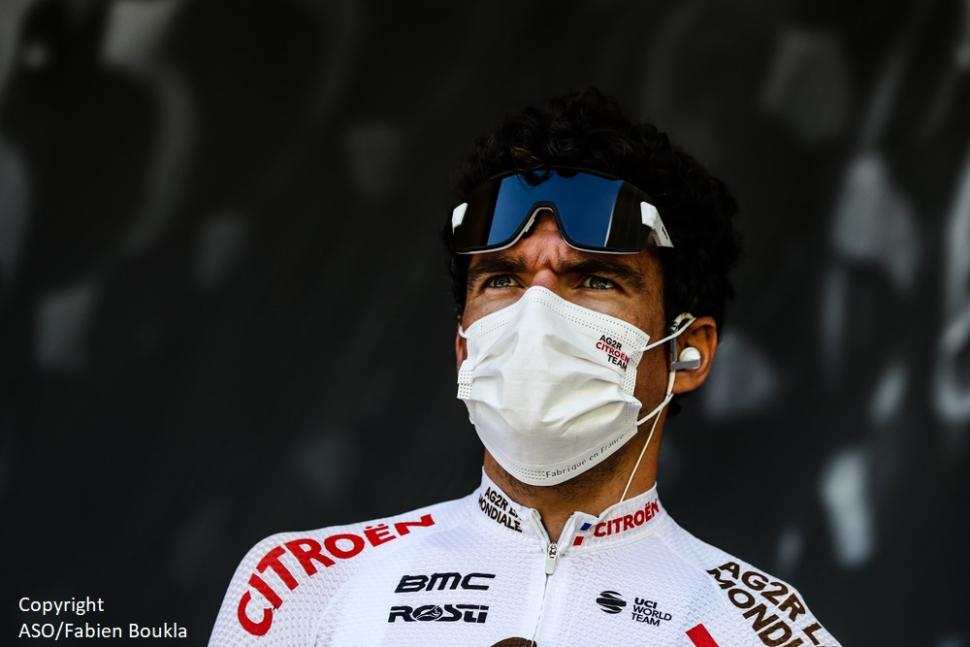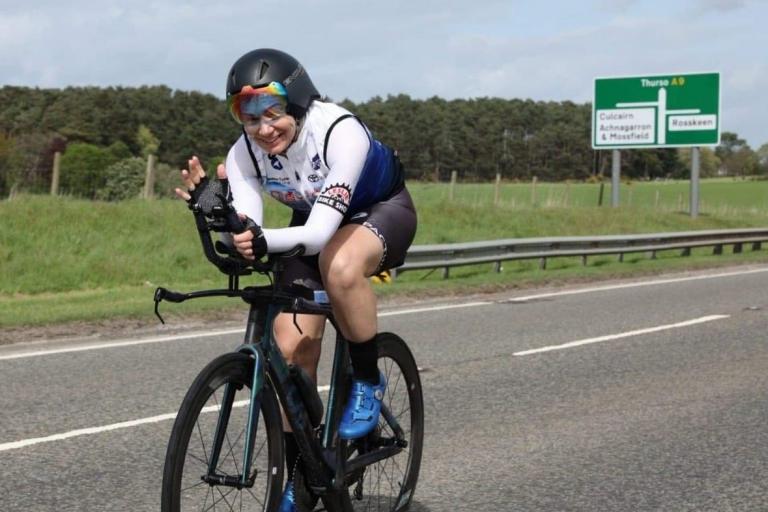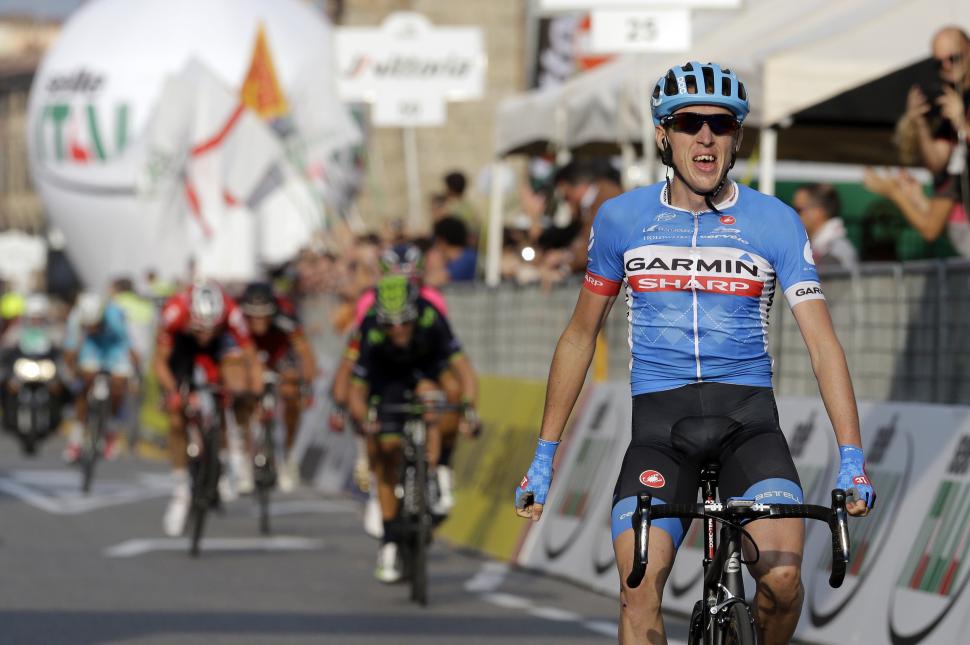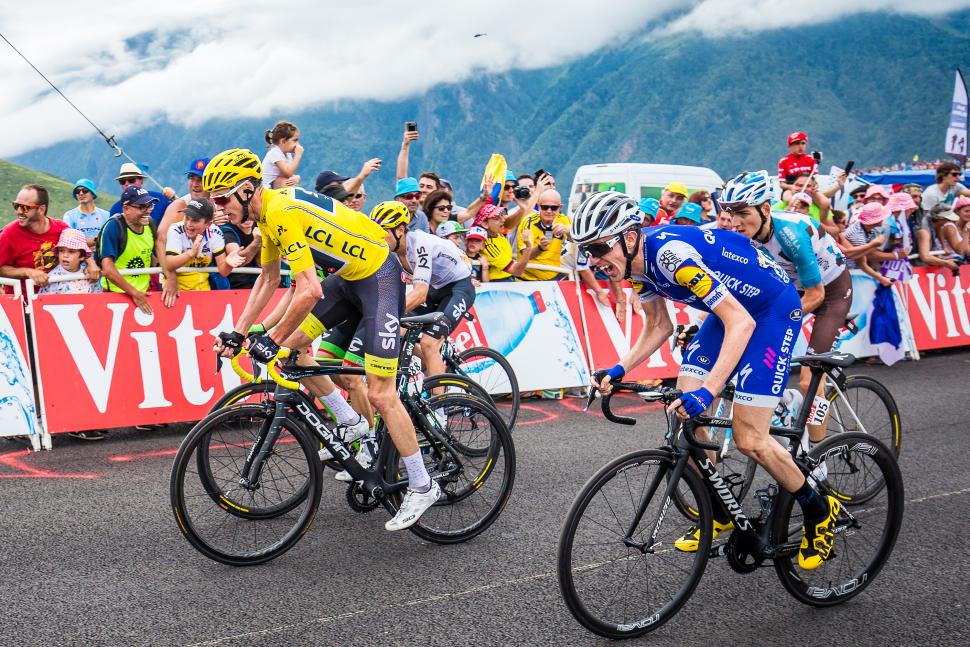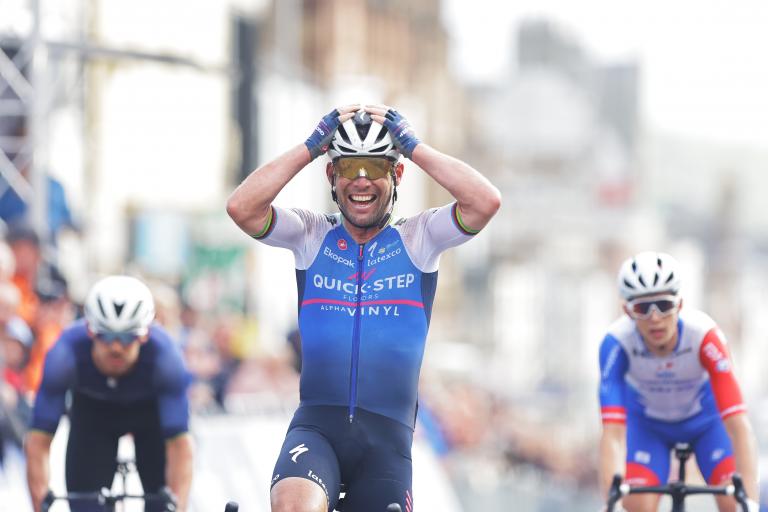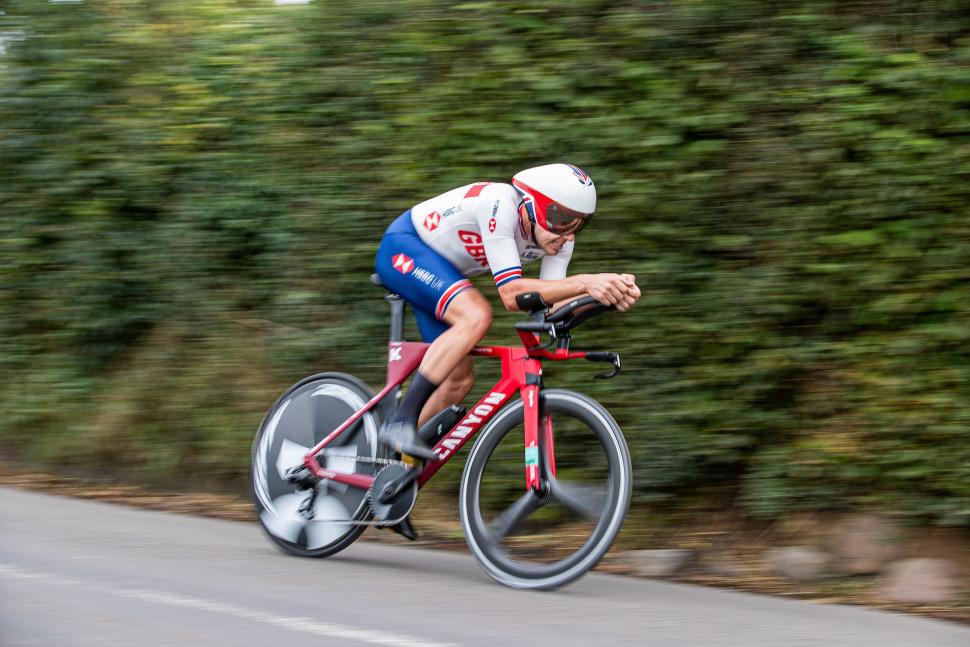- News
- Reviews
- Bikes
- Accessories
- Accessories - misc
- Computer mounts
- Bags
- Bar ends
- Bike bags & cases
- Bottle cages
- Bottles
- Cameras
- Car racks
- Child seats
- Computers
- Glasses
- GPS units
- Helmets
- Lights - front
- Lights - rear
- Lights - sets
- Locks
- Mirrors
- Mudguards
- Racks
- Pumps & CO2 inflators
- Puncture kits
- Reflectives
- Smart watches
- Stands and racks
- Trailers
- Clothing
- Components
- Bar tape & grips
- Bottom brackets
- Brake & gear cables
- Brake & STI levers
- Brake pads & spares
- Brakes
- Cassettes & freewheels
- Chains
- Chainsets & chainrings
- Derailleurs - front
- Derailleurs - rear
- Forks
- Gear levers & shifters
- Groupsets
- Handlebars & extensions
- Headsets
- Hubs
- Inner tubes
- Pedals
- Quick releases & skewers
- Saddles
- Seatposts
- Stems
- Wheels
- Tyres
- Health, fitness and nutrition
- Tools and workshop
- Miscellaneous
- Tubeless valves
- Buyers Guides
- Features
- Forum
- Recommends
- Podcast
news
“Bloody kids cycling on the pavement!”: Internet misses point of bike lane tweet; Is pro cycling boring to watch? Cash incentives to cycle to work; That’s how you celebrate a rainbow jersey; Cyclocross is back; Oblivious driving x2 + more on the live blog
SUMMARY
 'Bloody kids cycling on the pavement' tweet (Adam Bronkhorst, Twitter)
'Bloody kids cycling on the pavement' tweet (Adam Bronkhorst, Twitter)17 October 2022, 08:07
“Bloody kids cycling on the pavement! Why on earth do they do this?”: Internet misses point of sarcastic bike lane tweet
Road safety campaigner Adam Bronkhorst is something of a regular on the live blog. For example, just last week we featured his dismay at the barrage of anti-cycling Facebook comments which followed a post about a child being struck by a motorcyclist while riding their bike to school.
However, it appears that a fair chunk of the internet isn’t quite as familiar with Adam’s stance on cycling and road safety – or, indeed, the concept of irony – judging by the reaction to his latest submission to our ever-expanding ‘Why don’t cyclists use cycle lanes?’ collection:
Bloody kids cycling on the pavement!!!
Why on earth do they do this? pic.twitter.com/HJkWLQtHxA
— Adam Bronkhorst (@AdamBronkhorst) October 16, 2022
The replies were, let’s just say, interesting…
👀👏There's one reason with a big yellow arrow for you@allpartycycling @Chris_Boardman pic.twitter.com/CScVmbecgL
— Guanajuato (@Guanajuatouk) October 16, 2022
Serious question, to highlight the flaws in painted advisory cycle lanes and show why we need proper segregated protected cycle lanes.
— Adam Bronkhorst (@AdamBronkhorst) October 17, 2022
Tweeting about making he roads safer to encourage more people to cycle.
Helps with air quality. Health crisis. Reduce traffic. Helps with Cost of living crisis, reduce road deaths, helps with mental health etc.
I think that’s good enough to tweet about.
— Adam Bronkhorst (@AdamBronkhorst) October 17, 2022
100%. It's why i've been campaigning for several years to get cycle lanes in my town. Specifically on this road. I posted the pic to show exactly why kids cycle on the pavement or worse, don't cycle at all.
— Adam Bronkhorst (@AdamBronkhorst) October 16, 2022
Agree. We need proper cycle paths. And ones people can’t park in. That was the point of the tweet.
— Adam Bronkhorst (@AdamBronkhorst) October 17, 2022
On a serious note, the fact that so many Twitter users completely missed the sarcasm in Adam’s post perhaps gives us, after last week’s grim game of anti-cycling bingo on Facebook, another fascinating and rather frightening insight into the current state of online discourse surrounding cyclists and safe active travel infrastructure:
Can’t believe how many people completely missed the intention of your tweet Adam 🙄
— Tony - music, well-being, politics & life. (@toneolddude) October 17, 2022
Funny isn’t it.
— Adam Bronkhorst (@AdamBronkhorst) October 17, 2022
Much better. Although still not the properly segregated cycle lane we've been campaigning for years to get on this road so our kids can cycle safely and protected from traffic to school.
— Adam Bronkhorst (@AdamBronkhorst) October 16, 2022
17 October 2022, 15:55
Cycling is still exciting! According to the majority of road.cc readers, anyway
So far, it looks like there’s still some hope for professional bike racing (phew), with a strong 77 percent of road.cc readers – at the time of writing – arguing that cycling isn’t, despite Dan Martin’s claims earlier today, “boring”.
The comments, on the blog and on social media, have been somewhat divided, however, and have ranged from ‘Not sure what Dan’s been watching’ to ‘power metres need to go!’
No. Quite the opposite. Especially compared to the Sky-train years.
— buysheep (@buysheep) October 17, 2022
thisismyusername (yes, that’s their username) wrote: “Hmm, not sure what racing Dan has been watching this year. I mean, just a couple of weeks ago Mas and Pog were taking chunks out of each other at Il Lombardia, Remco vs Primoz was just hotting up till the latter crashed out and what about all the Spring Classics, and so on and on!”
Last TdF wasn’t boring.
— KAJones (@KAJones94226663) October 17, 2022
Compared to what?. Football, F1. We get to watch elite cycling 12 months of the year now. I think that is perhaps where the expression’too much of a good thing’ comes into play. The filming of races is good, what makes the difference is the commentator banter. That CAN be boring
— patrick ford (@kajaboss14) October 17, 2022
However, while most of those who have participated in the poll so far seem to agree with those sentiments, the comments section was very much pro-Dan…
alexuk said: “I agree with Dan. The worlds are the only event, where things can still be unpredictable. Radios and power metres have made things a bit more boring than in previous years. It’s still entertaining, but just not as entertaining as it was.
“I would support the removal of power metres. Pros now are just climbing with their heads glued to the numbers, not responding to attacks etc. Most GC groups roll in together, with only a few exceptions. Thank heavens for Pog, as Dan says, but one guy isn’t enough.”
Rendel Harris was another who argued that the widespread use of power metres was behind the perceived lack of unpredictable excitement.
“I think the genie is probably out of the bottle as far as power meters are concerned, training is so based around them that most pros will have a very good idea of what they're putting out anyway,” Renedel wrote.
“I've only had one for a year and I’m about as far from a pro as you can imagine but if I look at my speed and the incline I’m on and the direction of force of any wind I can guess my power within about +/-25W. It wouldn’t do any harm to remove them, but not sure it would make an enormous difference.”
Zac Williams/SWpix.com
With the 2023 Giro d’Italia parcours about to be announced this afternoon, squired also blamed race organisers for what they viewed as the plethora of insipid routes in recent years, writing: “I agree too. We did have an excellent and attacking Tour this year. However, the Giro and Vuelta were both extremely mediocre and defensive. Similarly, none of the shorter tours or one day races really stood out.
“There are a few young guys who are seemingly willing to risk it all to get the win, but the large portion of the peloton rides extremely defensively and in a controlled manner. I would argue though that often the selected routes are not good. A 5 percent 20km climb to the finish, for example, is sadly never going to produce exciting racing. The level is just too high now.”
Watch mountain biking instead. Downhill or XC, it's so much better
— Karl Roche - 🇪🇺 🇬🇧 🇹🇼 🇮🇪 🚵🏻♂️ (@ragtag) October 17, 2022
Ouch. Don’t go too far now...
17 October 2022, 15:37
2023 Giro d’Italia route due to be unveiled
The Giro d’Italia 2023 route presentation will happen shortly, in which Remco Evenepoel is expected to be announced as the race winner
— The TT Podcast 🚴 (@ttpdcst) October 17, 2022
17 October 2022, 15:03
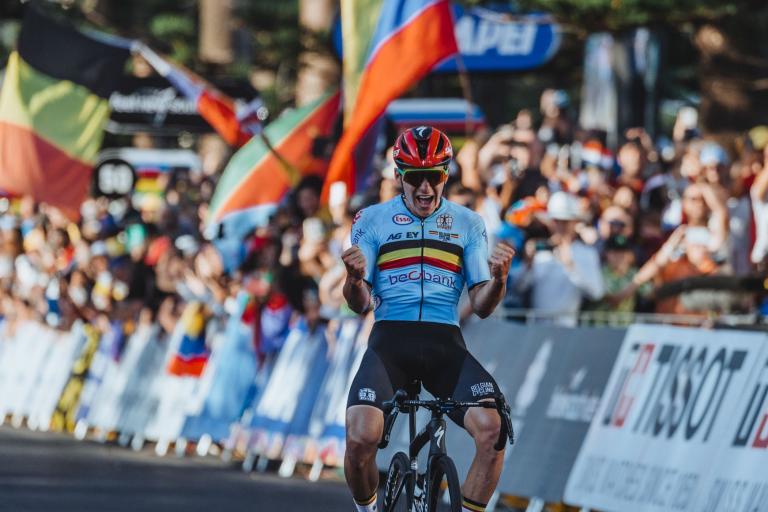
Greg Van Avermaet: “It’s impossible to put into words how good Remco Evenepoel is”
Speaking of exciting young talent wrongfully (in my opinion) categorised as boring, the new king of Belgium, Remco Evenepoel, has been praised by one of his country’s elder statesmen, Greg Van Avermaet, who described the world champion as “of a different order”.
In a special interview for Het Nieuwsblad alongside former pros Dirk De Wolf and José De Cauwer, the former Olympic champion and Paris-Roubaix winner was gushing in his praise for the 22-year-old Evenepoel, who stormed to victory at Liège-Bastogne-Liège, the world road race championships, and the Vuelta a España – Belgium’s first grand tour win for 44 years – during a remarkable 2022.
ASO/Fabien Boukla
“It’s talent. One that is only born every so often,” the 37-year-old AG2R Citroën rider said. “He has performed a lot of songs, but I especially thought the World Championship was incredible. Wow, two minutes, and riding away from the whole pack. Really, I can't get my head around that.
“I also won some races, but that was trying to finish it in the sprint and trying to do everything right beforehand. Few people really get away with that.
“When you’re on the front with Evenepoel, you don’t recover in the wheel. Riding someone off the wheel on the flat, who can do that?
“He suffers less than anyone else. I have met many riders, including super talents, but Remco is of a different order.”
Echoing comments made by Dan Martin in an interview with the Guardian – though the Irishman’s praise was directed at Tadej Pogačar, not Evenepoel – Van Avermaet concluded: “Honestly, I thought such a thing was no longer possible. Racing has become so controlled, there is so much team play, and then to make a difference on your own... Actually, it is impossible to put into words how good he is.”
17 October 2022, 14:44
Copy and Paste in overdrive at British Cycling…
Governance nerd that I am, it bothered me that @BritishCycling hadn’t posted any board minutes since March. I asked them why.
Their response assumes I was asking to oppose their Shell sponsorship. I wonder why they made that assumption?! https://t.co/cBsYX956rY pic.twitter.com/59Lwn2RUis— Alex Ingram (@nuttyxander) October 17, 2022
17 October 2022, 14:24
17 October 2022, 13:52
A day in the life of a cyclist… and 4x4 driver
#Cycling round Clapton roundabout just now, a woman in a huge #4x4 slows down & rolls down her window. With a smile on her face, she calls me a "w*nker" followed by a load of other abuse I couldn't quite decipher. She then drove off at speed. I was so shocked I didn't even react
— coshgirl (@coshgirl) October 16, 2022
It's astounding that someone thinks it's okay to abuse someone they don't know for no reason other than their form of transport. I can't imagine getting this kind of behaviour from a stranger in any other daily situation.
— coshgirl (@coshgirl) October 16, 2022
17 October 2022, 13:14
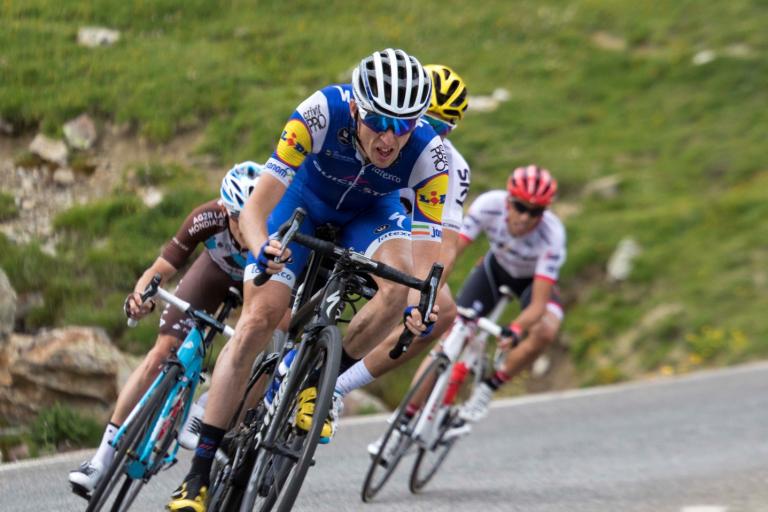
“Cycling is quite boring to watch now. Racing has become quite prescriptive,” says Dan Martin. Do you agree?
Professional cycling is boring to watch.
And no, that’s not the opinion of your next-door neighbour, asking how you could possibly insist on watching that ‘Giro de France rubbish’ when the third test of the Ashes is on, but Liège-Bastogne-Liège and Tour of Lombardy winner Dan Martin.
In a wide-ranging interview with the Guardian – to promote his recently-published autobiography Chased by Pandas – the retired Irish pro touched on, among other things, his desire to prove British Cycling and Dave Brailsford’s track-focused approach wrong early in his career, doping in the peloton (”throughout the history of testing, the cheats have always been ahead of the testers”), the physical and mental sacrifices required to stay at the top (citing the early retirements of Tom Dumoulin and Fabio Aru as examples of burnout), and the excesses and extremes permitted by teams if it means winning (Martin deplored the ‘eating is cheating’ mantra prevalent in the bunch and claimed that Chris Froome and Geraint Thomas had even deprived themselves of salads during the 2018 Tour, lest they retained “excess water” in their digestive tracts).
Martin wins Il Lombardia 2014 (Gian Mattia d'Alberto, LaPresse)
One of the more controversial points made by Martin in the interview, however, was that pro bike racing has become boring in recent years.
A prominent example of swashbuckling, aggressive racing throughout his career, the former Garmin rider told the Guardian how he had rejected a move to Team Sky in 2018, because he didn’t want to join a squad he says had “sucked the joy out of cycling”.
“That’s why I stopped riding this time last year – because the sport was becoming so controlled,” he said. “I’d lost my advantage because every cyclist now is told exactly what they’re doing and each team’s methodology is the same.
“I want to be able to decide why, when and what training I do and what tactics I use. If I had gone into that [Sky] team, I wouldn’t have enjoyed myself.”
Martin then claimed that the Sky effect – of imposing negative, controlled tactics on the bunch through an army of powerful domestiques – had infected the rest of the peloton in recent years.
“It’s the freedom of expression as well. That freedom to attack. Racing is quite boring to watch now as nobody makes mistakes any more.
“Everything is so fine-tuned you don’t see guys having bad days. Everybody is nutritionally perfect, training is perfect, and it’s lacking that human element. Racing has become quite prescriptive.”
Unipublic:Graham Watson
That comment may surprise cycling fans, who have been rushing over themselves in recent years to proclaim the advent of a new golden era for road racing, but the 36-year-old says any excitement in the men’s sport comes as a result of one rider only.
“Even though people say it’s the best racing ever, it’s really down to Pogačar. He is the loose cannon who attacks whenever he feels like it, whereas the rest of the racing is so scripted and controlled.”
What do you think? Is Martin right? Has the men’s side of the sport become too controlled, to the point of no return? Have race radios and finely-tuned nutrition and training plans drained road racing of its colour, turning the riders into pre-programmed robots?
With respect to Dan, I disagree. WVA, MvDP, AVV, Pog, Rog, Pidders, Jonas, Begbie, Cecilie, Vos, Remco, Cavendish - should I go on?
— Ned Boulting (@nedboulting) October 17, 2022
In this humble writer’s opinion, the answer is no. While a brilliantly inventive and attacking racer himself, the high points of Martin’s career – the early to mid-2010s – represented a particular nadir for exciting cycling (with the exceptions of occasional standout performances from the likes of Boonen, Cancellara and Sagan, and the odd free-for-all at the Giro or Vuelta).
During that period, in the biggest races at least, teams rushed to emulate Sky’s patented mountain train, which suffocated grand tours to the extent that it made US Postal’s Playstation racing of the early 2000s feel like the height of panache, while the sprinters’ teams were so dialled in that breakaway merchants needn’t have bothered getting out of bed on the morning of a flat Tour stage.
Alex Whitehead/SWpix.com
But since the Covid-era (though there were certainly rumblings of it beforehand), a new generation of male riders has emerged, keen to rip up the script and throw away the old formula by attacking, often recklessly, from distance and racing to win throughout the year, on any terrain. And it’s not just Pog either: Jumbo-Visma – who at one point seemed destined to become the Sky of the 2020s – won their Tour this year by throwing caution to the wind and, dare I say it, attacking. That’s before we even get onto the sheer 1980s-style madness of the likes of Evenepoel, Van der Poel, and Van Aert.
It may not be perfect, of course – and many have already deemed Remco’s long-range attacks ‘boring’. But just thank your lucky stars it’s still not 2012, eh?
However, not everyone in the office agrees with me. road.cc co-founder Tony Farrelly thinks Martin has a point, “apart from sprint finishes and nice helicopter shots.”
Tony says, “It’s one of those sports (like tennis) that’s better to play than to watch.
“Or as a member of the Who once said, like heavy rock, fun to play, but he wouldn’t want to listen to it.”
What do you think? Do you agree with Dan? Has the men’s side of professional cycling become too boring? Or have we truly entered a new golden age of swashbuckling, unpredictable racing?
Let us know!
17 October 2022, 12:37
More ‘where’s Cav off to next?’ news…
17 October 2022, 11:55

“Cycling is still going to be my life”: Alex Dowsett bows out of the peloton at Chrono des Nations
It’s perhaps fitting that Alex Dowsett – a Giro d’Italia time trial stage winner, a six-time British champion against the clock, and a lover of a good old-fashioned club 10 – would end his professional cycling career riding alone, propped on a set of aero bars.
While the former Hour Record holder (see, more solitude) couldn’t live with the pace of Stefan Küng on the Chrono des Nations’ 45.4km course around Les Herbiers yesterday, finishing 23rd in the end, the 34-year-old from Essex still enjoyed his last outing as an elite pro road racer.
> Alex Dowsett retires from top-level professional cycling
“57 minutes of me time today that brought a lot of thoughts and emotions up: uphill headwind sections thinking ‘I’m not going to miss this’, downhill tailwind sectors thinking ‘I’m going to miss this’, and everything in between,” Dowsett wrote on social media following his final race.
“It’s been a privilege to have been a pro at the highest level for so long. I’ll miss competing at the highest level, but I’ve missed being able to compete with the best for a while now, which is what made the Tirreno result earlier this year [where he finished fifth in the opening time trial] pretty special. Thanks to the Chrono des Nations and people of Les Herbiers for a warm welcome and making my last pro race such a memorable day.
“It’s going to take a while to process this fully, it’s been my life since I left school at 18. I’d imagine there’ll be times I’ll wish I was still in it and times where I’m happy I called it.
“Cycling is still going to be my life but in a different direction now and I’m excited for it. And I know I’ve got some great people around me for when I’m struggling with the change.
“Thanks to all of you here for the support, through the good, the bad, and the period where we had to post reels every day to pay for an Hour Record.”
Dowsett on his way to a career best fifth place at the 2019 world time trial championships in Yorkshire (Zac Williams, SWPix.com)
Several of Dowsett’s former teammates and colleagues took to social media to congratulate the two-time Giro stage winner on his 12-year professional career, which included stints at Team Sky, Movistar, Katusha and Israel-Premier Tech.
“Congratulations Alex! Enjoy your much deserved retirement and family time,” wrote former world champion and Paris-Roubaix winner Lizzie Deignan.
Austrian Marco Haller, a teammate of Dowsett’s at Katusha, described the British rider as “arguably the best roommate ever. One of the best teammates definitely. Some achievements I can only dream of. I take my hat off to honour you career. Congratulations mate! All the best for whatever comes next!”
“Very grateful we crossed paths in our careers mate. Thanks for being one of the good ones,” said Irish time triallist Ryan Mullen, before offering this sage piece of career advice: “Just promise me you won’t do commentary, your voice is far too boring for commentary.”
Congrats on your career Alex, and best of luck for your retirement!
17 October 2022, 11:34
I’ll see your panda suit, and raise you an actual monkey…
A monkey enjoyed a front-row seat at the #tourdelangkawi today! 🐒🇲🇾
Head over to https://t.co/8FSJcLL3Gx for a replay of Stage 7 📺 pic.twitter.com/YihO35wbzz
— GCN Racing (@GcnRacing) October 17, 2022
17 October 2022, 11:19
17 October 2022, 10:51

Cash for Cycling: Employees offered financial incentive to commute to work by bike
Staff at a Ministry of Defence site in Shropshire are being offered incentives to commute to work by bike in a pilot scheme designed to “lead the way in showing others what’s possible”.
The 20 employees at the military base in Donnington, Telford, have been asked to walk or cycle to work 10 times during October – and if they do ditch the car, they will be given £50 in supermarket vouchers, the BBC reports.
The project is being piloted by Telford and Wrekin Council’s Health Protection Team, with the aim, if it proves a success, of expanding it across the region next year.
Councillor Richard Overton, who described the pilot as a “super scheme” said: “I very much hope it will nudge these individuals into reducing their reliance on cars over the longer term, supporting our vision to make Telford and Wrekin carbon neutral by 2030, improve their health and local air quality, and lead the way in showing others what's possible.”
“The ride into work is great, all downhill with the wind in my hair. However, the journey back not so much – this is where the hard work comes in,” Rebecca Thomas-Nye, one of the pilot’s participants, told the BBC.
“I am hopeful that with each ride back it will get easier and the benefits will show in how I feel.”
17 October 2022, 10:20
“Totally oblivious driver posts clip of another bad driver not realising he also was a bad driver”
Thanks to road.cc reader AlsoSomniloquism for flagging this double dose of oblivious driving, which caused the cyclist on the receiving end to cry out in frustration.
Not that the motorist who submitted the footage could hear the cyclist's shouts over his own smug critique of the driver in front…
As hirsute astutely pointed out in the comments, “Don’t think either driver had any idea of the cyclist’s existence”.
17 October 2022, 09:55
Tekkers
The nights are getting longer, the tracks worlds is done and dusted, and the road season is clinging on by its finger nails, which mean only one thing – the greatest sport in the world, cyclocross,* is back!
10/10. No notes #GPOisterwijk https://t.co/WRa2mQSheO
— Jens Dekker (@jens_dekker) October 16, 2022
Will we see Fem van Empel jumping the barriers tonight? She did it in practice yesterday 👀 #CXWorldcup pic.twitter.com/WlfPZC6AnI
— Cyclocross Social (@Cyclocrosss) October 16, 2022
*This statement may not accurately reflect the views of everyone at road.cc, though it definitely should.
17 October 2022, 09:27
“The best singing of a national anthem by a winning athlete in the history of winning athletes singing national anthems”
Now, I’m not typically one for overt displays of patriotism, but this brilliantly jubilant performance of La Marseillaise by 20-year-old Marie-Divine Kouamé – after winning the 500m time trial ahead of six-time world champion Emma Hinze – has to go down as one of the defining moments of last week’s world track championships in Saint-Quentin-en-Yvelines:
This is the best signing of a national anthem by a winning athlete in the history of winning athletes singing national anthems. The hero in question is @mariedivine91 https://t.co/WSct5aEXV6
— Ned Boulting (@nedboulting) October 15, 2022
“Yesterday, when Mathilde [Gros] won [the women’s sprint], we were in front of the telly crying," Kouamé told the media after claiming her first rainbow jersey on Saturday. “We thought it was incredible, and honestly I dreamed of this race.
“Now I just want to get back to training to come back and win the 500m, the keirin, the sprint, everything.”
Now, you certainly wouldn’t bet against Kouamé singing her heart out in the same velodrome, with an Olympic gold medal around her neck, in the summer of 2024…
17 October 2022, 08:47
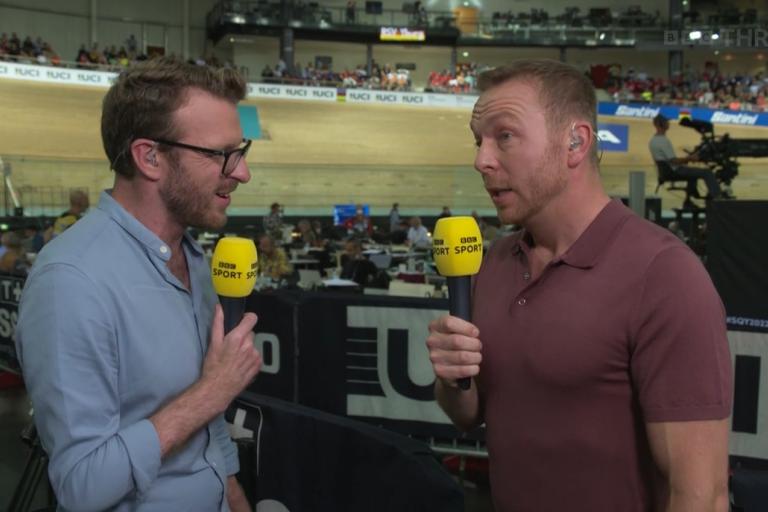
Weekend catch-up
If you were out on your bike enjoying the rather changeable weather (I think it’s safe to say that the turbo trainer is looking like an increasingly enticing prospect, for some of us anyway), you may have missed some of the latest developments in the cycling world featured on the site this weekend.
So, here’s a Monday morning tea break catch-up session especially for you, featuring everything from Chris Hoy’s defence of that Shell deal to Cav’s 2023 teaser, hit-and-run videographers and a rather sweary – and gloriously stubborn – cycling pensioner:
> Teenager arrested after hit-and-run motorist filmed ‘deliberately ramming’ cyclist
> Chris Hoy: British Cycling deal can ‘put cycling on Shell’s agenda’
> “I’ve got a big year next year”: Mark Cavendish hints at new team for 2023
> Deliveroo cyclist attacked by knife-wielding teenager after collision
> “Crazy” plans to scrap key cycle lane – because of flash floods – shelved by council
After obtaining a PhD, lecturing, and hosting a history podcast at Queen’s University Belfast, Ryan joined road.cc in December 2021 and since then has kept the site’s readers and listeners informed and enthralled (well at least occasionally) on news, the live blog, and the road.cc Podcast. After boarding a wrong bus at the world championships and ruining a good pair of jeans at the cyclocross, he now serves as road.cc’s senior news writer. Before his foray into cycling journalism, he wallowed in the equally pitiless world of academia, where he wrote a book about Victorian politics and droned on about cycling and bikes to classes of bored students (while taking every chance he could get to talk about cycling in print or on the radio). He can be found riding his bike very slowly around the narrow, scenic country lanes of Co. Down.
Add new comment
20 comments

Alleynian
|
2 years ago
3 likes
A big 16 year-old kid riding without sufficient care on the pavement crashed into my other half's arm this week while she was walking along it. He didn't apologise but cycled off without checking she was OK. She was quite bruised. She saw him go into a shop and went in and confronted him about it. His response was "Whatever."
She usually cycles but had left her bike at home due to a puncture. Yes I can understand why kids cycle on the pavement (though this particular main road is not dangerous and has speed bumps) but for the minority of them that think it is OK to ride at speed on a busy pavement, they should reconsider their choices.
If you cycle on the pavement, you should always respect those on foot in the same way we cyclists expect motor vehicle users to respect our right to use the road and our vulnerability against two-tons of steel.
A big 16 year-old kid riding without sufficient care on the pavement crashed into my other half's arm this week while she was walking along it. He didn't apologise but cycled off without checking she was OK. She was quite bruised. She saw him go into a shop and went in and confronted him about it. His response was "Whatever."
She usually cycles but had left her bike at home due to a puncture. Yes I can understand why kids cycle on the pavement (though this particular main road is not dangerous and has speed bumps) but for the minority of them that think it is OK to ride at speed on a busy pavement, they should reconsider their choices.
If you cycle on the pavement, you should always respect those on foot in the same way we cyclists expect motor vehicle users to respect our right to use the road and our vulnerability against two-tons of steel.
Wishing your other half a speedy recovery.
You're absolutely right about taking care if cycling on pavements, but young-uns have a reputation for being reckless.



Hirsute
|
2 years ago
3 likes
Comments closed on this but one to keep an eye on
https://www.bbc.co.uk/news/uk-wales-63290905
Driver on Facebook when Dyfed Powys police officer killed - court

Patrick9-32
|
2 years ago
6 likes
The 4x4 tweet states "It's astounding that someone thinks it's okay to abuse someone they don't know for no reason other than their form of transport."
The trouble is it is not astounding at all, it is completely normalised and somewhat expected. It should be astounding but it isn't.

The 4x4 tweet states "It's astounding that someone thinks it's okay to abuse someone they don't know for no reason other than their form of transport."
The trouble is it is not astounding at all, it is completely normalised and somewhat expected. It should be astounding but it isn't.
Indeed, as I replied on Twitter...



alexuk
|
2 years ago
0 likes
I agree with Dan. The worlds are the only event, where things can still be un-predicatable. Radios and power meters have made things a bit more boring than in previous years. Its still entertaining, but just not as entertaining as it was. I would support the removal of power meters. Pro's now are just climbing with their heads glued to the numbers, not responding to attacks, etc. Most GC groups roll in together, with only a few exceptions. Thank heavens for Pog, as Dan says, but one guy isn't enough.

I agree too. We did have an excellent and attacking Tour this year. However, the Giro and Vuelta were both extremely mediocre and defensive. Similarly none of the shorter tours our one day races really stood out. There are a few young guys who are seemingly willing to risk it all to get the win, but the large portion of the peloton rides extremely defensively and in a controlled manner. I would argue though that often the selected routes are not good. A 5% 20km climb to the finish, for example, is sadly never going to produce exciting racing. The level is just too high now.

I think the genie is probably out of the bottle as far as power meters are concerned, training is so based around them that most pros will have a very good idea of what they're putting out anyway; I've only had one for a year and I'm about as far from a pro as you can imagine but if I look at my speed and the incline I'm on and the direction of force of any wind I can guess my power within about +/-25W. It wouldn't do any harm to remove them, but not sure it would make an enormous difference.
RoubaixCube
|
2 years ago
0 likes
£50 shopping vouchers??
Is it £50 per day? £50 per week? £50 a month??
If its £50 for all of those 10 days, Id rather just take the car otherwise its not much of an incentive.
Though it would be ironic if a few of them said yes. Got the £50 voucher then left their car at home but arrived to work on their motorbike.




AlsoSomniloquism
|
2 years ago
5 likes
Totally oblivious driver posts clip of another bad driver not realising he also was a bad driver. Listen to the cyclist yell out.
As of last night, there was one comment stream where most pointed out he shouldn't have tried to overtake anyway at that point, even with the other poor driver being around.

Latest Comments
- Oldfatgit 4 min 19 sec ago
I guess I'm odd as this time of year I'd normally do a 4 hour gravel ride on 1/2 bottle of water, a latte and a bacon roll....
- Eton Rifle 52 min 39 sec ago
The system for elderly drivers in the UK is insane. Basically, once you hit 70 years old, you have to re-apply for your driving licence every three...
- Moist von Lipwig 1 hour 21 min ago
Bit of googling gone wrong in the article - the JAT is the Junction Assessment Tool, the Joint Approval Team appears to be a coutner terrorism...
- HKR 2 hours 36 min ago
Can't believe that child threw his bike on the floor at the end of that. Young people today have no respect... ;))
- Griff500 1 hour 24 min ago
Its not the same stem fitted to the two bikes though, and we aren't talking about HTA we are talking about stem inclination or "stem rise" to use...
- TheBillder 10 hours 37 min ago
My new double glazed wooden framed sash windows are £1600 plus vat per (quite large) window. House built in 1904. The cost includes fitting and...
- galibiervelo 10 hours 53 min ago
We promote #bikefriday You dont need it - go for a spin. Nice bikes and kit are lovely, but not as noice as a dawn spin this friday morning with a...
- David9694 10 hours 56 min ago
Council acting like ‘the Sheriff of Nottingham’ with parking charges...
- David9694 11 hours 34 sec ago
Man taken to hospital after vehicle crashes into pub...

